CA orders ERC chair to inhibit from NGCP rate case to prevent bias

Facade of the Court of Appeals taken in March 2015. INQUIRER FILE PHOTO/RAFFY LERMA
MANILA, Philippines — The Court of Appeals (CA) ordered Energy Regulatory Commission (ERC) Chairperson Monalisa Dimalanta to inhibit herself from proceedings related to the National Grid Corporation of the Philippines’ (NGCP) rate reset.
This stemmed from a decision dated April 30 from the CA’s Special 11th Division, ruling that Dimalanta “should have recused herself from further participating” in the NGCP’s fourth regulatory period rate reset application.
The ERC completed the NGCP’s rate reset last April, fixing the grid operator’s maximum allowable revenue at P335.78 billion for 2016 to 2022 and allowing it to recover P28.29 billion in project costs.
“We find that [Dimalanta] gravely abused her discretion when she refused to inhibit from the proceedings a quo despite her evident bias and partiality against the [NGCP],” the CA decision said.
The ERC required the NGCP to submit its expenditures from 2016 to 2022, in a September 2022 resolution amending rules for setting transmission wheeling rates.
Dimalanta then held a press briefing in October 2022, to discuss the expected result of the reset process, but the NGCP would not file its rate reset application until December 2022.
The grid operator filed nine motions for reconsideration and motions to resolve regarding Dimalanta in 2023 before it brought the case before the CA.
According to the NGCP’s motion, Dimalanta made public statements that “demonstrated she already prejudged” the grid operator’s rate reset application before it had been filed.
READ: Power rate hikes loom as NGCP cleared to recoup P28.3B
“[Dimalanta] could not be expected to render a fair judgment when she already has an outcome in mind, waiting only to be formalized after petitioner undergoes the charade of formal hearing,” the CA decision said.
“By issuing premature public statements, [Dimalanta] somehow deprived [the NGCP] of its right to a fair and impartial administrative process,” it added.
INQUIRER.net sought comment from Dimalanta, but she has yet to respond.